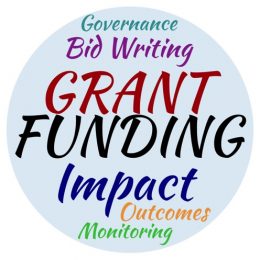 Having talked about how to make yourself more fundable in the previous post, we are now going to have two posts considering more about Money.
Having talked about how to make yourself more fundable in the previous post, we are now going to have two posts considering more about Money.
Income streams
The greater the diversity of options you hold for income, the more financially stable your charity will be and the more confidence a funder will have in your financial resilience. There are many possibilities:
 Donations – Fundraising events, special offerings, regular donors, crowd funding. These funds are normally unrestricted (see below).
Donations – Fundraising events, special offerings, regular donors, crowd funding. These funds are normally unrestricted (see below).- Grants – Generally awarded by grant making trusts as restricted funding, given for a specific activity / purchases. They are often project based (more below).
- Earned Income – Selling goods or services that might be related or unrelated to your charity’s objects. You may need to consider setting up a trading subsidiary if this is not ‘primary purpose’ trading. Get good legal and tax advice on this before you start.
- Contracts – Deliver goods or services under a contract arrangement. Again you may need to consider setting up another legal vehicle to facilitate this if it is not ‘primary purpose’ trading. If you are not sure, check it out!
- Loans – These will need to be repaid, normally with interest. It is important to have a clear legal agreement which could be as simple as an exchange of letters stating the terms of the loan, interest payable, repayment dates etc. Once again, advice should be sought.
Reserves
Reliance on just one form of income can leave you exposed to external influences over which you may have limited control. It is important to keep enough Reserves to reduce the potential impact of adverse financial situations. The amount you hold helps funders assess a charity’s long-term financial stability or vulnerability.
Restricted and Unrestricted Income
 It is very important to understand these. Restricted funding is generally given to a charity for a specific project or purchase over a set period of time. This requires care in spending, recording and monitoring
It is very important to understand these. Restricted funding is generally given to a charity for a specific project or purchase over a set period of time. This requires care in spending, recording and monitoring
- Funds can be spent only on what they were awarded for.
- Make sure you get your project budget and funding request right, as you can’t go back to a funder later on if you find you need more money.
- Funds need to be accounted for on a separate line in your finances and accounts, with costs tracked against the grant budget.
- Help yourself by keeping a copy of all receipts relating to expenditure with your grant agreement, as it will make your end-of-grant monitoring easier.
- Talk to the funder if you are unlikely to spend all the money awarded. You can’t just decide to spend it on something different without prior approval.
Unrestricted income usually comes from donations and fundraising activities. This can be used by the charity for any purpose it chooses (within its objects), including core costs or activity costs. It is really helpful to have a good percentage of your income from such sources.
Core Funding
Some funders specialise in awarding funding to cover core costs which may be restricted or unrestricted. There are less of these funders available, but they are worth pursuing as they are very valuable in a charity’s funding mix.
In the next part focusing on money, we will be looking at match funding and sustainability.
